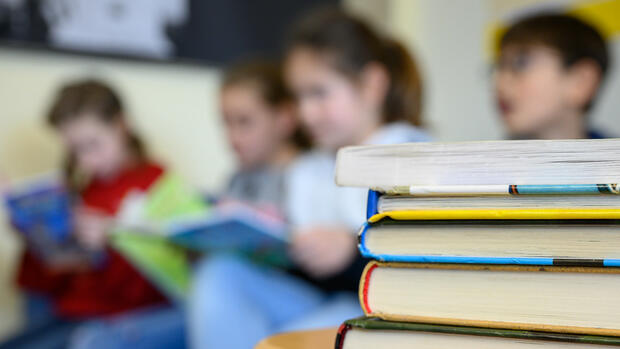According to a study, one in four fourth graders in Germany cannot read properly.
(Photo: dpa)
Berlin Germany’s fourth graders perform significantly worse in reading than their peers in other countries. In the current international primary school reading survey (Igloo), Germany came in twelfth out of 19 places in the EU in 2021. The distance to the leaders Finland and Poland is around half a school year.
The survey takes place every five years. It has been observed for 15 years that primary school children in Germany are reading less and less well. The pandemic has further amplified this trend. During the pandemic, classes were completely or partially canceled on 183 days – significantly more often than in other countries.
The German school system is also increasingly failing to even out the differences between the students. The group of those who do not have the skills for secondary schools is growing, the much smaller group of good and very good fourth graders is shrinking.
The fact that a quarter of fourth graders are now considered to be poor readers is “alarming”, said Federal Education Minister Bettina Stark-Watzinger (FDP).
From 2024, she wants to support 4,000 schools with a particularly large number of disadvantaged students with one billion euros annually. However, the federal and state governments are still arguing about the details of the “Starting Opportunities Program”.
The German school system demands a growing proportion of migrants
In addition to Corona, the growing proportion of migrants is challenging schools, but other countries are coping much better with it. The head of the igloo tests in Germany, Nele McElvany, is therefore also calling for nationwide language tests for daycare children and compulsory courses for those with deficits in Germany in order to significantly increase the chances of all first graders.
>> Read here: When ChatGPT does the homework – students are excited, teachers helpless
The authors of the “National Education Report” also recently sharply criticized the fact that the federal states do not test all four-year-olds for their German language skills or, in the event that they identify deficits, do not provide compulsory support. There is currently funding mainly in Hamburg.
The example of Singapore shows how important mandatory tests and the scientifically based, individual funding that builds on them are. 20 years ago, the island state was still behind Germany when it came to igloos, today it is the international leader. According to experts, however, resistance among German teachers to scientific methods of measuring performance is still relatively high.
Elementary school students read less than in other countries
One thing is clear: German elementary school students read far less in class than students in other countries. According to the igloo, an average of 141 minutes are allotted for this per week in Germany – 194 minutes across the EU and even 205 minutes across the OECD. According to this, German elementary school students enjoy reading above average, but do not get enough time to practice. “That has to change,” said the new chairwoman of the Conference of Ministers of Education, Berlin’s new school senator Katharina Günther-Wünsch (CDU).
Sabine Döring, State Secretary in the Federal Ministry of Education, also sees increasing competition with reading, for example from electronic media. In addition, the Iglu authors are pushing for more and better training for primary school teachers, especially with a view to promoting reading.
More: The number of young unskilled workers has risen to a record high of more than 2.6 million
